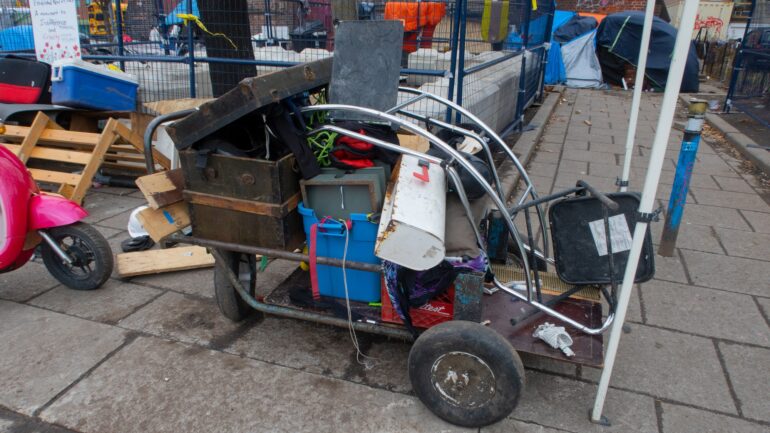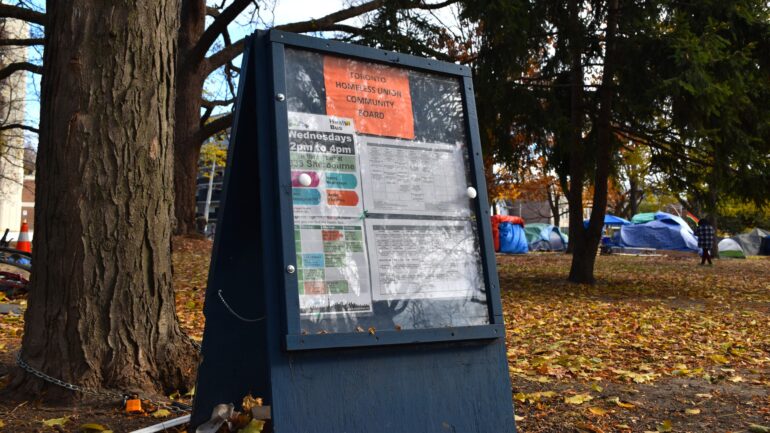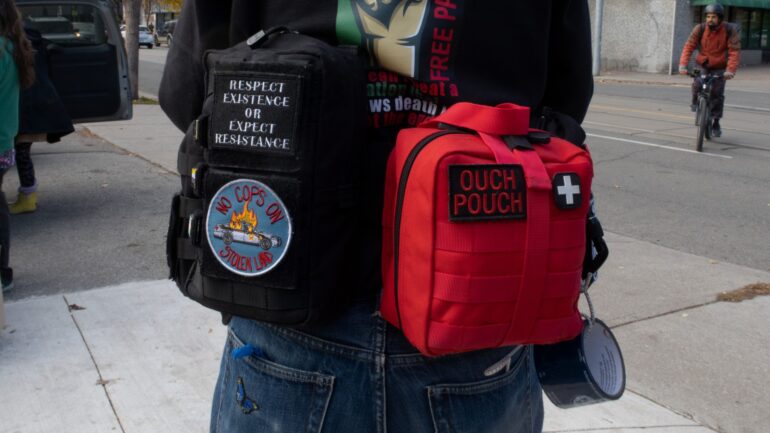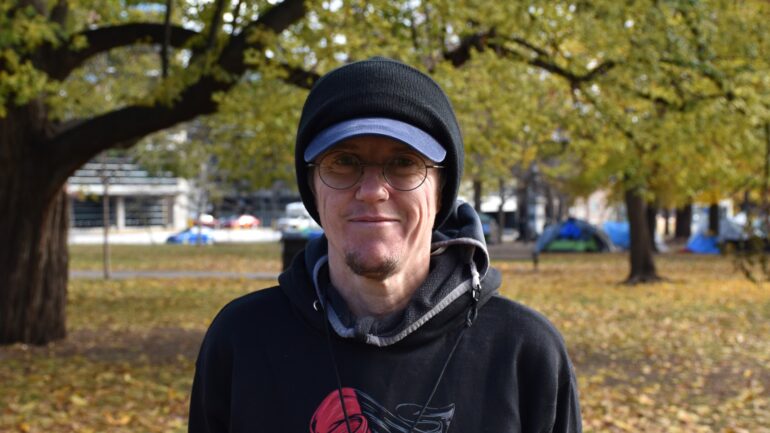By Jeferson Quiros-Vargas and Annicca Albano
One predawn morning at around 4 a.m., while the city slept, Al awoke to a woman screaming and crying.
Al, whose last name is being withheld due to concerns surrounding harassment, checked the tent next to theirs, where the sound came from. Inside was a man who said everything was okay. The woman, who was cold and had been offered shelter, was raped, Al recounted.
“That’s the kind of situation that people end up in when you don’t let people set up their own tents and have their own personal space and their own autonomy,” Al said.
Al, whose pronouns are they/them, endured almost nine months unhoused, more if couch-surfing at their friend’s house counts. They consider having a roof over their head during the cold season a stroke of luck, given over 10,000 people are unhoused as of October, according to City of Toronto shelter data.
Moreover, about 275 people are turned away from shelters every night.
The city’s Winter Services Plan includes adding up to 180 shelter spaces, expanding Warming Centre operations and enhancing street outreach efforts to persuade people to come indoors, but only when temperatures drop to -15 degrees.
Any colder, combined with wind chill, heightens one’s risk for frostbite, according to William Osler Health System.
“The City acknowledges that it may not be sufficient to address the increasing demand for shelter and housing,” the news release read.
“We live in a place with unlimited need, with limited resources,” said Deqa Farah, director of housing access at Fred Victor, a Toronto-based charity dedicated to helping people with little to no income secure housing, employment and health care.
Farah said various things could prolong the housing process, including discrimination and inflexibility from landlords, unavailability of treatments around withdrawal management and brain injuries resulting from assaults.
She said people should be more understanding, even if addiction and mental health issues are what drove people to homelessness.
“I don’t see anyone who romanticizes an encampment… what leads people to those spaces is desperation and lack of options,” she said.
Anyone who has thoughts of self-harm should call 9-8-8, the Suicide Crisis Helpline. Those who feel they need counselling can contact Wellness Together Canada at 1-888-668-6810.

Personal belongings left behind after the Saint Stephen-in-the-Fields encampment eviction near Kensington Market. Photo credit: Jeferson Quiros-Vargas
When encampment displacement happens, authorities “take people’s tent and insulation, pallets, sleeping bags, winter clothing, blankets, everything a person needs to survive, including the documents people need to qualify for housing,” said Jennifer Jewell, a disabled, queer woman in her 50s, and a member of the Toronto Underhoused and Homeless Union.
Jewell is a former encampment resident at Dufferin Grove Park.
“When people are stationary, meal programs, Streets 2 Home, harm reduction, medical care and other supports know where to find them,” she said. “They lose those when they’re displaced, too.”

Toronto Homeless Union set up a community board advertising essential services at Allan Gardens. Photo credit: Annicca Albano
The city evicted the encampment near Kensington Market on Nov. 24, in what advocates called a traumatizing decision. A petition on Change.org is also demanding the Toronto City Council to “restore Allan Gardens for everyone,” citing Toronto City Bylaw 608, which prohibits individuals from living in tents on public parkland.
The petition has collected more than 3,000 signatures as of Dec. 15.
A.W. Peet, a volunteer with the mutual aid collective Toronto Food Not Bombs (TFNB), has been helping run weekly food drives at Allan Gardens to feed anyone in need.
Peet, whose pronouns are they/them, is a physics professor at the University of Toronto.

A.W Peet’s “batman” belt. They carry around supplies to help repair and aid those in need. A main tool in the belt set is duck tape which is used to repair slashed tents and make them waterproof. Photo credit: Jeferson Quiros-Vargas
When Humber News met them, Peet wore what they called a “Batman belt.”
“It’s got all sorts of stuff on it: things to fix tents and, if somebody got their tents slashed by someone with a knife, I got a tape to fix it,” Peet said, who joined the group last winter.
While extreme cold keeps meals for longer, Peet said that any water bottle people buy or receive must be kept close to their bodies or wrapped in clothing so they won’t freeze.
“[The city has] plenty of gardeners that water all the plants, loads and loads of water for the plants, water for the dogs, but no water for the human beings,“ Peet said.

Toronto Food Not Bombs member A.W Peet after a Sunday of volunteering at Allen Gardens. The chapter has distributed free groceries and packaged food, with no registration or eligibility requirement, to local community members since 2016. Photo credit: Annicca Albano
Fellow member Ian, whose last name is being withheld due to harassment concerns, manages TFNB’s TikTok account, where he updates donors, explains their mission and encourages community members to help.
“One individual can’t change the world, but we can take steps to change the corner of it that we belong to,” he said.
However, Ian said the responsibility to help the less fortunate shouldn’t solely be on individuals.
The Toronto City Council unanimously approved the Ontario-Toronto New Deal on Wednesday.
“We’re unlocking Toronto’s potential,” Mayor Olivia Chow said in a statement. “We now have billions more to spend on affordable housing, fixing our aging transit system and building communities with all the things that make them wonderful places to live.”
In the meantime, more than 10,000 unhoused people in Toronto will have to wait.
Al, 20, would have specialized in history or psychology had they not dropped out of the University of Toronto, where they said accessibility services were inadequate.
Al engaged in encampment support and activism before experiencing homelessness.
When they first got offered an apartment, they were met with dead bed bugs and cockroaches and a door that “had damage from someone trying to break in.”
They said the Toronto Housing Community’s policies involve deciding on the spot. Al declined the offer.
“It takes a lot to make an apartment worse than a tent in a park, where I’m scared for my life,” they said.
They sometimes left the park to update their taxes, get a driver’s licence and meet social workers, not knowing if they would have their tent and all their belongings upon their return.
“When you feel like every level of the government and every level of society has abandoned you and wants you dead, you do what you need to do [to survive],” Al said, who moved to a more suitable THC for them and their two cats, Goose and Bones, this year.

